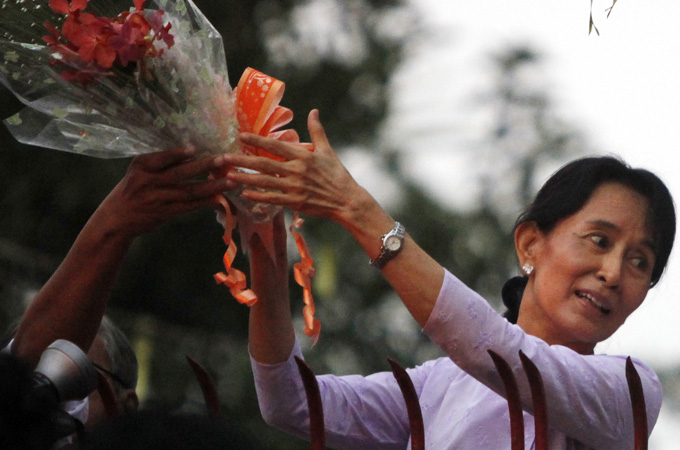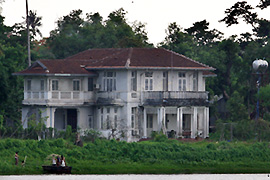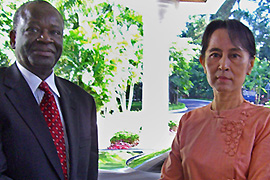With ballots already counted at several polling stations in Naypyidaw, the opposition National League for Democracy (NLD) is close to victory in three of the capital’s four constituencies.
According to a local reporter, the NLD is well ahead in two constituencies—Pobba Thiri and Dakkina Thiri, led by candidates Zay Ya Thaw and Naing Ngan Lin respectively.
A third seat, in Zabu Thiri, is also likely to go to the NLD candidate Sandar Min, the reporter said.
In Naypyidaw’s fourth constituency, Ottara Thiri, indications are that USDP candidate Hla Thein Swe leads, with ballots still being counted.
Sunday, 1 April 2012
I Voted for Party Which Serves the People: Khin Nyunt

Former Burmese Prime Minister Khin Nyunt talks to reporters after voting at a polling station in Mayangone Township on Sunday.
Khin Nyunt, who is also a former spy chief, spoke to journalists after casting his ballot in Rangoon on Sunday—but did not disclose which party he voted for.
However, he said that he cast his vote in accordance with the will of the majority.
Meanwhile, his son, Zaw Naing Oo, told reporters in Rangoon that he voted for May Win Myint, a candidate representing the main opposition National League for Democracy (NLD) party led by Nobel laureate Aung San Suu Kyi.
Khin Nyunt and his family cast their ballots in Mayangone Township to the north of the former capital. Despite the lack of an official comment by Khin Nyunt, many journalists believe that he also voted for the NLD.
According to preliminary results coming from polls so far, it is believed that Suu Kyi’s party is currently leading the race with the military-backed Union Solidarity and Development Party (USDP), which is filed with many ex-junta members, in second place.
Nyan Win, the main spokesperson for the NLD,“According to results so far, we can say that the condition of our party is good.”
Suu Kyi is contesting one seat for Kawhmu Township out of 45 constituencies up for grabs in the by-elections.
Profile: Aung San Suu Kyi
Released after enduring house arrest for years, Aung San Suu Kyi has become an icon of peaceful resistance. |
 Aung San Suu Kyi is widely seen as the symbol of peaceful resistance in her struggle for democracy
Aung San Suu Kyi is widely seen as the symbol of peaceful resistance in her struggle for democracyAwarded the Nobel Peace Prize in 1991 for "her non-violent struggle for democracy and human rights", Aung San Suu Kyi has become an icon of Myanmar's struggle for democracy and of the global struggle against oppression.
Kept under house arrest or in jail for most of the past 21 years, she is the most prominent of more than 1,000 political prisoners held by Myanmar's military government.
Born in Rangoon, now Yangon, in June 1945, Aung San Suu Kyi is the daughter of Myanmar independence hero General Aung San.
He was assassinated by political rivals when she was just two years old, six months before Myanmar, then known as Burma, was granted independence from Britain.
As a young woman, Aung San Suu Kyi studied politics in New Delhi before moving to Oxford University in the UK in 1964 where she studied philosophy, politics and economics.
There she met and married British academic Michael Aris, with whom she had two sons, Alexander and Kim.
Rising discontent
In 1988 Aung San Suu Kyi returned to Myanmar to look after her mother, who had suffered a stroke.
Her return coincided with a period of rising discontent with the military government of Myanmar's ruler, General Ne Win.
When that boiled over into nationwide pro-democracy protests, she found herself unable to stay silent.
 |
| Aung San Suu Kyi is the daughter of Myanmar independence leader General Aung San |
She was named secretary-general of the National League for Democracy (NLD) and travelled the country calling for peaceful reform and democratic rule.
On September 18, 1988 the Myanmar military launched a bloody crackdown on protesters in which an estimated 2,000 people died.
Aung San Suu Kyi's mother died in December of that year but she stayed on in Myanmar, keeping up the campaign for an end to military rule.
In July 1989, in an effort to silence her, the military government placed her under house arrest in her lakeside villa on Yangon's University Avenue, accused of "endangering the state".
She was offered freedom on the condition that she left the country, but she refused.
Landslide victory
A year later, apparently confident that its crackdown had worked, the military government called a nationwide general election - Myanmar's first in 30 years.
The NLD scored a landslide victory, winning 392 of 485 parliamentary seats, although Aung San Suu Kyi herself was barred from standing.
Stung by the rejection, the military refused to recognise the result and announced it was extending Aung San Suu Kyi's detention.
| "It is not power that corrupts but fear. Fear of losing power corrupts those who wield it and fear of the scourge of power corrupts those who are subject to it." - Aung San Suu Kyi |
Pictures of the woman many refer to simply as The Lady are kept and maintained with almost spiritual reverence, even though owning such items has in the past attracted serious repercussions from the authorities.
In 1991 Aung San Suu Kyi was awarded the Nobel Peace Prize in recognition of her achievements as "the symbol of the revolt against violence and the struggle for a free society".
"The little woman under house arrest stands for a positive hope," said Francis Sejersted, chairman of the Nobel committee, at the prize ceremony.
"Knowing she is there gives us confidence and faith in the power of good."
Movements restricted
In 1995 following intense international pressure, the military government announced it was freeing Aung San Suu Kyi from house arrest, although in practice her movements remained highly restricted.
Four years later her husband, Michael Aris, whom she had not seen for several years, died of cancer in the UK.
 |
| She has spent most of the past 20 years under house arrest in her Yangon home |
In 2000, after breaking travel restrictions by travelling to the northern city of Mandalay for a meeting with NLD officials, she was again put under house arrest.
She was freed two years later, but in May 2003 was sent to Yangon's notorious Insein prison following a bloody clash between NLD supporters and a pro-government mob.
After several months in the jail she was returned to house arrest in her crumbling lakeside villa, where she was held virtually incommunicado for years.
Visitors to the house were tightly restricted, while mail and telephone communications were monitored and intercepted.
Frail figure
The few people who had made contact with her during her house arrest said the growing frustration at the lack of progress with the government had taken a heavy toll on her health.
Photographs of meetings with the United Nations' special envoy, Ibrahim Gambari, showed a thin and frail figure, spurring renewed international calls for her release.
 |
| Photos in early 2009 raised concerns over Aung San Suu Kyi's poor health |
In one of her most famous speeches delivered before the 1990 elections, she called for a country free from fear.
"It is not power that corrupts but fear," she said.
"Fear of losing power corrupts those who wield it and fear of the scourge of power corrupts those who are subject to it."
In 2009, Aung San Suu Kyi was convicted of violating the condition of her detention by allowing John Yettaw, a US national, to stay at her home after he swam across a lake to get there.
She has since offered to lobby the international community to lift wide-ranging sanctions on Myanmar, many of which were imposed more than two decades ago.
In the 2010 general elections, held for the first time in 20 years, Aung San Suu Kyi was barred from contesting and her NLD party boycotted the vote.
Aung San Suu Kyi was released on 13 November 2010, and, after boycotting elections that year, she stood as a candidate in the April 1, 2011, by-election for the constituency of Kawhmu, south of Yangon.
She said that she did not regret standing for parliament, as it boosted people's interest in politics after decades of military rule.
Suu Kyi 'wins seat' in Myanmar parliament
| Democracy icon's party says she has triumphed in by-election contest seen as test of government's commitment to reform |
A senior party member, speaking shortly after polls closed on Sunday, said that Suu Kyi, who spent years as a political prisoner, had secured more than 80 per cent of votes in the constituency of Kawhmu, south of Yangon.
"Reports are coming through that Suu Kyi has won the polls in Kawhmu, a very poor, rural part of Myanmar ... That is a place where she spent the night on Saturday night, with the locals out there. She has been out there campaigning a couple of times, where she has received an incredible response," said Al Jazeera's Wayne Hay, reporting from Yangon.
Sunday's vote is seen as a key test of the military-backed civilian government's commitment to recent democratic reforms.
Hay said that provisional results from further north, an area near the city of Mandalay, where there were 10 seats up for grabs also suggested that NLD was ahead in eight of those seats.
More than six million people were eligible to vote on Sunday, with a total of 160 candidates from 17 parties, including six new to the political stage, contesting for 45 parliamentary seats.
The number of seats at stake is not enough to threaten the military-backed ruling party's overwhelming majority, secured in full elections in 2010.
Suu Kyi's apparent victory had been widely expected, despite complaints by the NLD over alleged voting irregularities and campaign intimidation.
She said she did not regret standing for parliament because the polls had boosted people's interest in politics after decades of outright military rule ended last year.
The government for the first time invited teams of foreign observers from the Association of Southeast Asian Nations [ASEAN], European Union and the US, and journalists to witness the elections.
Political reforms
Since taking office a year ago, President Thein Sein has carried out reforms including releasing hundreds of political prisoners, easing media restrictions and welcoming the opposition back into mainstream politics.
Our correspondent, reporting earlier from Kawhmu, said: "There are international monitors on the ground, but they are not allowed inside the polling booths. They are certainly not allowed to oversee the counting when that starts later on Sunday."
"So, they are here to observe overall process, talk to voters about any irregularities that they might have seen," he said.
"What we are hearing is that some voters have complained that voting sheets have been tampered with. Some voters have complained that inside the polling stations some of the officials have been coercing voters into voting for a certain party.
"So, not the best of starts, but certainly something the National League for Democracy and Suu Kyi were expecting."
Nyan Win, a spokesman for the party, told the AFP news agency on Sunday that his party had submitted a letter of complaint to the country's election commission regarding alleged irregularities involving ballot papers that could potentially be invalidated without due cause.
The NLD won a landslide election victory in 1990 but the ruling military never allowed it to take office. The party also boycotted the 2010 polls that swept the army's political proxies to power and were marred by complaints of cheating and intimidation.
Suu Kyi, who spent most of the past 22 years as a political prisoner, described the vote as "a step towards step one in democracy", despite complaining on Friday that the polls were not "genuinely free and fair".
"What has been happening in this country is really beyond what is acceptable for a democratic election. Still, we are determined to go forward because we think that is what our people want," the Nobel peace laureate said.
Subscribe to:
Comments (Atom)
About Me
- The Voice Of Rohingya
- Maung daw, Arakan state, Myanmar (Burma)
- I am an independent man who voted to humanitarian aid.
